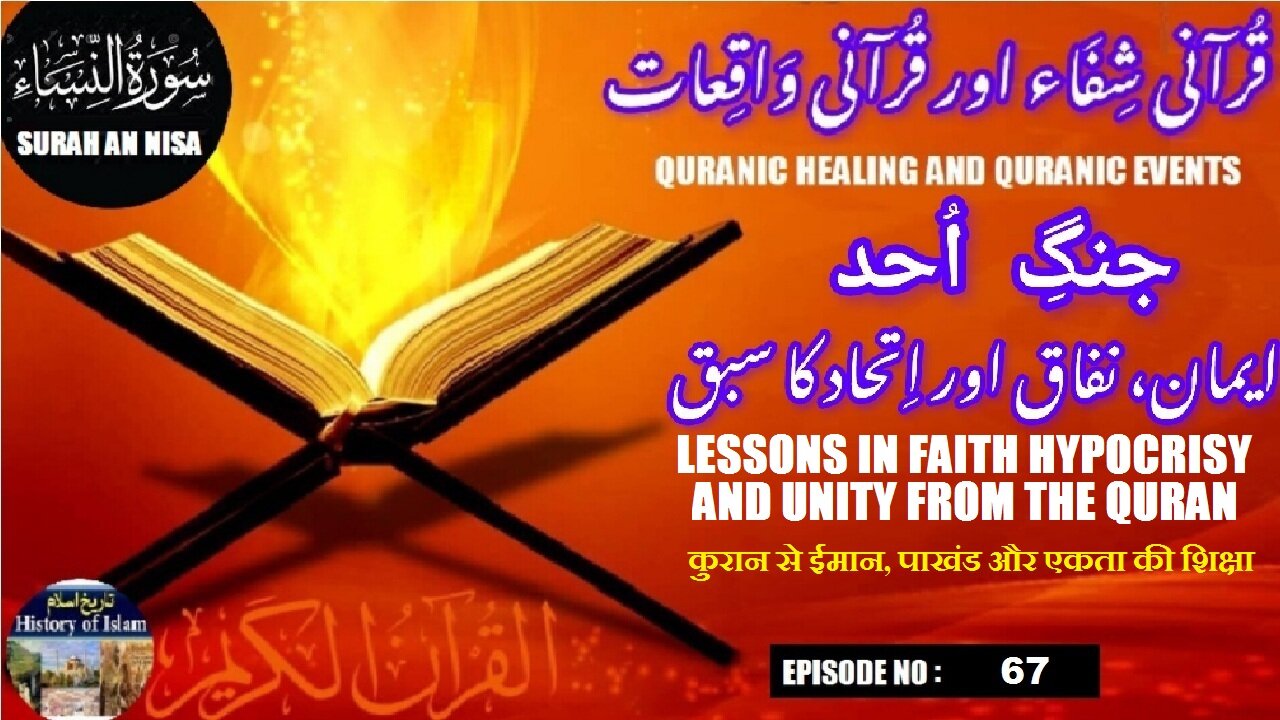Premium Only Content

Lessons in Faith, Hypocrisy and Unity from the Quran قرآن سے ایمان، نفاق اور اتحاد کا سبق
@islamichistory813 #healing #and #events #from #the #quran #historical #stories #and #events #quranicstories #selfhealing #success #stories #striking #events #in #history #quranstories, #storiesfromthequran #religious #creation #stories #trending #quran #short #historical #loves #historical #heroes #what #is #true #strength #calm #quran #recitation #for #babies #islamic #healing
The Battle of Uhud, Lessons in Faith, Hypocrisy, and Unity from the Quran
Brothers, sisters, friends and elders Assalamu Alaikum, wa Rahmatullahi wa Barakatuhu, we are presenting the 67th episode of the Islamic informative video based on healing and events from the Holy Quran, and in this video we will describe,The Battle of Uhud: Lessons in Faith, Hypocrisy, and Unity from the Qur’an
The Battle of Uhud and its aftermath, as described in the Qur’an—particularly in verses 4:71–78 and 4:88–91—offer profound lessons on courage, faith, hypocrisy, and the importance of unity in the face of adversity. This battle, fought in the third year after the Hijrah (migration to Medina), was a significant turning point in the early history of Islam. While the Muslims had achieved a surprising victory at Badr the year before, Uhud tested their resolve in a far deeper way. The Qur’anic verses that reflect on this battle do not shy away from exposing the weaknesses that emerged among some of the Muslims. Instead, they present an honest account that not only acknowledges moments of fear and hesitation but also instructs future generations on the dangers of cowardice, hypocrisy, and disunity.
Verse 4:71 begins with a call to preparedness: “O you who have believed, take your precaution and \[either] go forth in companies or go forth all together.” This verse emphasizes the importance of vigilance and strategic planning in times of conflict. The Muslims are urged not to be complacent or careless, especially after suffering losses at Uhud. It reflects a shift in the mindset of the Muslim community—from initial victory at Badr to a sobering realization of their vulnerabilities at Uhud. The verses that follow, particularly 4:72 and 4:73, address the presence of hypocrisy and fear within the ranks. “Among you are those who lag behind; and if disaster strikes you, he says, ‘Allah has favored me in that I was not present with them.’” These words capture the attitude of certain individuals who lacked genuine commitment to the cause of Islam. Their hesitation, driven by fear of death or loss, reveals a disconnect between their outward identity as Muslims and their inner convictions.
This theme continues in verse 4:74, which contrasts the behavior of the hypocrites with that of true believers: “Let those fight in the cause of Allah who sell the life of this world for the Hereafter.” The verse highlights the ultimate motivation that separates the faithful from the hesitant—the willingness to sacrifice worldly comfort for eternal reward. In the context of Uhud, this was especially relevant. The Muslims initially had the upper hand in the battle, but a group of archers disobeyed the Prophet’s command and abandoned their positions to gather spoils. This strategic error led to a devastating counterattack by the Quraysh, resulting in heavy losses, including the death of Hamza ibn Abdul-Muttalib, a beloved uncle of the Prophet Muhammad. The chaos and retreat that followed exposed deep fractures within the community, as some fled while others remained steadfast.
Verses 4:88–91 further explore the implications of this internal weakness, focusing on those who sought to spread fear and confusion among the believers. “What is \[the matter] with you \[that you are] two groups concerning the hypocrites?” asks verse 4:88, pointing out that some Muslims were unsure how to deal with individuals whose loyalty was doubtful. The hypocrites, or *munafiqoon*, were a growing challenge in Medina. Outwardly, they claimed to follow Islam, but their actions revealed a desire to undermine the Muslim cause, particularly in times of crisis. Some even attempted to avoid participation in the battle altogether or returned midway, spreading panic and demoralization among the troops. The Qur’an responds decisively, warning against taking such people as allies or protectors, especially when their actions threaten the unity and safety of the Muslim community.
The Qur’an does not merely criticize these individuals but provides guidance on how the community should move forward. It teaches believers to be discerning, not blindly trusting those whose loyalty is questionable, yet also not rushing to judgment. Verses 4:89–90 clarify the conditions under which former enemies or hypocrites may be treated as non-hostile—if they desist from fighting and seek peace. This shows the balance Islam maintains between justice and mercy. The underlying message is clear: while fear and hypocrisy weaken the collective strength, sincere repentance and peace are always valued.
In the aftermath of Uhud, these revelations served to rebuild the morale of the believers and reinforce the spiritual discipline necessary for future challenges. The lessons learned were not only about military strategy but about the inner battle between faith and fear, sincerity and pretense. The Muslims were reminded that true success lies not in numerical strength or temporary victory, but in steadfastness, unity, and trust in Allah. The Battle of Uhud remains a powerful reminder that even in defeat, there are lessons that shape the soul of a community, and through hardship, believers are refined and strengthened.
With this, we ask for your permission until tomorrow and pray to Allah Almighty to grant us the ability to act on the Quran and Hadith, Amen
Allah Hafiz
============================
-
 6:36
6:36
ISLAMIC HISTORY
5 hours agoMuslim Heritage and Islamic Scholars introductory مسلم ورثہ اور اسلامی اسکالرز کا تعارف
1 -
 46:25
46:25
The Quartering
5 hours agoMeta PC Winner, Trump Ruins Libs Dark Fantasy & Raja Jackson Case Heats Up!
106K45 -
 LIVE
LIVE
Rallied
3 hours ago $4.11 earnedWarzone Challenges w/ Doc & Bob
210 watching -
 LIVE
LIVE
StoneMountain64
3 hours agoNew Missions for Battlefield 6 Unlocks (+New Mouse and Keyboard)
124 watching -
 2:09:47
2:09:47
Nerdrotic
8 hours ago $5.32 earnedHollywood's Long Dark Summer of the Soul - Nerdrotic Nooner 511
55.3K2 -
 1:36:05
1:36:05
Side Scrollers Podcast
5 hours agoStreamer ATTACKS Men Then Cries Victim + Pronoun Rant Anniversary + More | Side Scrollers
33.2K -
 12:06
12:06
Liberty Hangout
1 day agoDemocrat Woman Can't Define 'Woman'
49.6K79 -
 LIVE
LIVE
GritsGG
8 hours agoRumble Customs! 3515 Ws! 🫡!
364 watching -
 38:39
38:39
Grant Stinchfield
6 hours ago $2.71 earnedHow Local TV News LOST Its Soul
39.4K4 -
 2:09:51
2:09:51
Badlands Media
16 hours agoBadlands Daily: Sept. 1, 2025 – Trump vs. Big Pharma, Giuliani Crash, and Mortgage Fraud Fallout
76.4K51